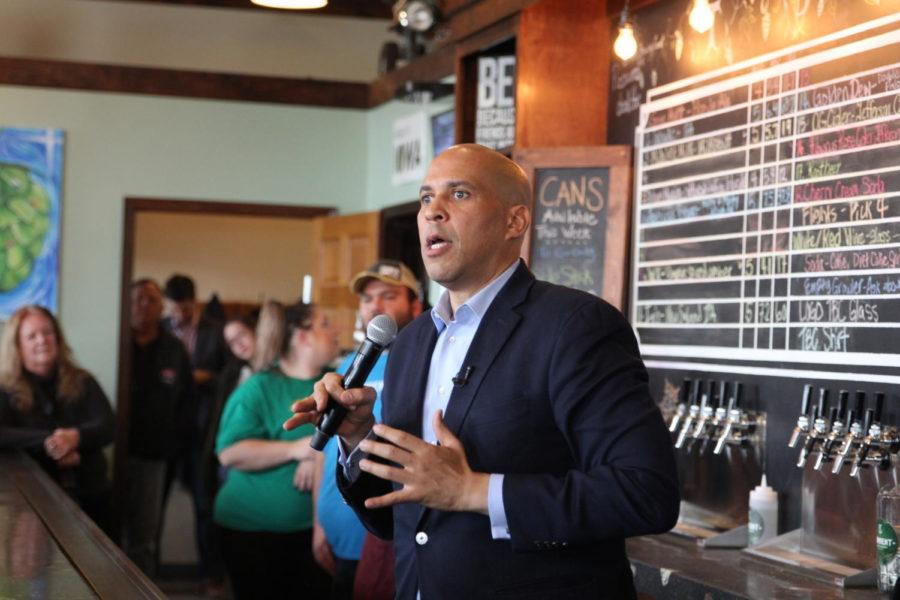Democratic presidential candidates question party diversity as debate deadline looms
Sen. Cory Booker speaks to potential Iowa caucusgoers Nov. 10 at Torrent Brewing Company in Ames. The then-presidential candidate discussed his plan to empower small towns and rural communities.
December 9, 2019
The 2020 Democratic primary field was the most crowded and diverse in the party’s history with more than two dozen candidates entering the race; however, the party is now at risk of hosting a debate with all white candidates.
Sen. Kamala Harris had qualified for the December Democratic debate but ended her primary campaign, citing a lack of financial resources to continue in the race. Presidential candidate Sen. Cory Booker, the only African American Democratic senator besides Harris, remarked on her exit from the race in a speech Thursday in Des Moines.
“It’s a problem that an immensely qualified, widely supported black woman running to lead a party that is significantly powered by black women didn’t have the resources she needed to continue on,” Booker said. “What message does this send about our party? Voters didn’t determine her destiny. But black women voters will determine our party’s ability to win.”
The departure of Harris from the Democratic primary leaves just six candidates qualified for the party’s December presidential debate: former Vice President Joe Biden, Sen. Bernie Sanders, Sen. Elizabeth Warren, Mayor Pete Buttigieg, Sen. Amy Klobuchar and businessman Tom Steyer.
“And so, I’m just going to say it plain, it is a problem that we now have [an] overall campaign for the 2020 presidency that has more billionaires in it than black people,” Booker said.
There are three billionaires running for president in 2020: Steyer, former New York Mayor Michael Bloomberg and President Donald Trump. Booker and former Massachusetts Gov. Deval Patrick are the two remaining black candidates in the race.
Four candidates have cleared one of the two thresholds to qualify for the debate, having received the requisite number of donors, but they lack the qualifying polls needed to receive a podium on the debate stage: businessman Andrew Yang, Rep. Tulsi Gabbard, Booker and former Housing and Urban Development Sec. Julián Castro. All four candidates have ethnic minority backgrounds.
The deadline to qualify for the debate scheduled for Dec. 19 is Thursday.
Speaking to reporters after a presidential forum Friday in Waterloo, Iowa, Castro said he believes the diversity of the Democratic Party should be reflected on the debate stage.
“I don’t want anybody to vote for or against any of the candidates on the December debate stage because of the color of their skin,” Castro said. “People have a wealth of experience. At the same time, representation does matter — it does mean something. […] I don’t think that just because someone is a person of color they should be elected president. What I believe is that if you have seven, eight or nine people on the debate stage, and we are the party of diversity, then that should probably be somewhat reflected on the debate stage.”
Castro had previously called for the Democratic Party’s primary calendar to be changed to reflect the diversity of the party. The first two states to vote in the Democratic primary are Iowa and New Hampshire, both of which have electorates that are more than 90 percent white.
“Last month I said that I don’t believe Iowa or New Hampshire should vote first — sparking a lively debate in our party,” Castro said in a tweet Sunday. “This Tuesday I’ll hold a town hall in Iowa to hear from voters why they agree or disagree.”







